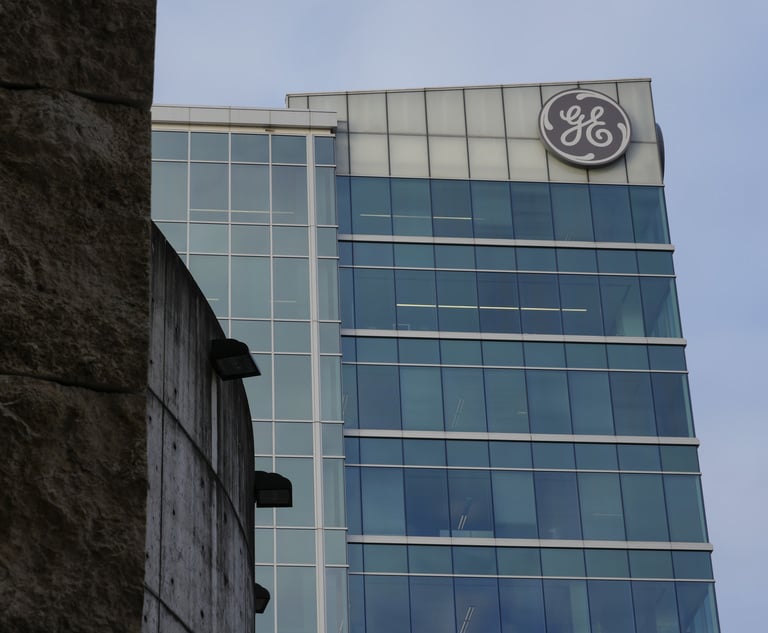 U.S. Environmental Protection Agency headquarters. Photo: Diego M. Radzinschi/ALM
U.S. Environmental Protection Agency headquarters. Photo: Diego M. Radzinschi/ALMTrump's EPA, Delaying Obama Rule, Makes 'Mockery' of Law, DC Circuit Says
"EPA may not employ delay tactics to effectively repeal a final rule while sidestepping the statutorily mandated process for revising or repealing that rule on the merits," D.C. Circuit Judges Judith Rogers and Robert Wilkins wrote Friday.
August 17, 2018 at 12:14 PM
6 minute read
The original version of this story was published on National Law Journal
A U.S. appeals court on Friday shut down an effort by Trump administration environmental regulators to continue delaying an Obama-era chemical disaster rule, saying the agency was making a “mockery” of federal law and “grasping” at generalized authority to avoid implementing the regulations.
The U.S. Court of Appeals for the D.C. Circuit struck down, unanimously, a “delay rule” the U.S. Environmental Protection Agency adopted last year to freeze enforcement of the Obama administration provisions. The rules, which the EPA put on hold until February 2019, expanded chemical-disaster provisions including safety audits, emergency response and technology requirements.
Friday's decision is another victory over the Environmental Protection Agency for New York Attorney General Barbara Underwood, whose office led a coalition of 11 attorneys general in a lawsuit last year challenging the delay.
The rule would mandate additional safeguards to prevent accidents at chemical plants. That could include new emergency response procedures, analyses of safer technology, annual notification drills, and more.
The rule was scheduled to go into effect in March 2017, but former EPA Administrator Scott Pruitt delayed the implementation until February 2019. Underwood's office claimed in last year's complaint that Pruitt delayed the rule based on comments from oil, gas and chemical industry associations and companies.
The court said in its decision that the EPA's delay of the rule was “arbitrary and capricious.” The decision also said the EPA did not properly explain why it decided to delay the rule.
“By delaying the effective date, EPA has delayed compliance, reduced or eliminated the lead-up time to achieve the compliance that EPA had earlier found necessary, and thus has delayed life-saving protections,” the decision said. “EPA may not employ delay tactics to effectively repeal a final rule while sidestepping the statutorily mandated process for revising or repealing that rule on the merits.
Underwood echoed those comments in a statement on Friday.
“We should all agree that protecting workers, first responders and communities from chemical accidents is a top priority,” Underwood said. “This decision is a major victory for New Yorkers'—and Americans'—health and safety, ensuring that the EPA cannot put special interests first and block commonsense protections against toxic chemical accidents.”
A spokeswoman for the Environmental Protection Agency did not immediately respond for comment.
Environmental advocates in June 2017, bringing a case in the D.C. Circuit, challenged the EPA's continued delay of the chemical disaster rule. Business advocates, including the American Petroleum Institute and U.S. Chamber of Commerce, both represented by Hogan Lovells, intervened in the case to support the EPA.
D.C. Circuit Judges Judith Rogers and Robert Wilkins comprised the panel in the case Air Alliance Houston v. EPA. Judge Brett Kavanaugh heard arguments but did not participate in the vote, as his U.S. Supreme Court nomination is pending.
“By delaying the effective date, EPA has delayed compliance, reduced or eliminated the lead-up time to achieve the compliance that EPA had earlier found necessary, and thus has delayed life-saving protections,” the D.C. Circuit said. “EPA may not employ delay tactics to effectively repeal a final rule while sidestepping the statutorily mandated process for revising or repealing that rule on the merits.”
 Judge Judith Rogers.
Judge Judith Rogers.Rogers and Wilkins, in their per curiam ruling, said it's “well established that an agency may not circumvent specific statutory limits on its actions by relying on separate, general rulemaking authority.” The panel said there was “no attempt by EPA to consider how much time industry needs to comply, or why 20 months, as opposed to some other period of delay, are necessary.” The EPA's arguments, the judges proclaimed, make a “mockery” of federal statute.
The ruling was not entirely out of the blue. Judges have pushed back against Trump agencies' efforts to delay compliance with Obama-era regulations. The Trump administration embraced delay tactics widely last year, testing the power of federal agencies to pause compliance rather than undertake the more challenging, and lengthy, process of formally undoing rules.
Just this week a Republican-appointed federal trial judge in South Carolina this week enjoined nationwide the EPA's move to suspend the Obama-era “waters of the U.S.” rule, commonly known as “WOTUS.” The 2015 regulations broadened the scope of what are considered the “waters” of the United States. Environmental advocates last year sued the Trump administration for suspending the rule, which had been tangled up in litigation ever since it was promulgated.
The U.S. Department of Justice unsuccessfully resisted a national injunction. U.S. District Judge David Norton of the District of South Carolina wrote in his decision: “Just because the political shoe is on the other foot does not mean that nationwide injunctions are no longer appropriate. What is good for the goose is good for the gander.”
Law professor Jonathan Adler said on Twitter about the “waters of the U.S.” ruling: “Further evidence that Trump administration's insistence on quick and dirty revisions of Obama rules are highly vulnerable to legal challenge. You can't cut corners with administrative reforms if you want them to survive.”
The Trump administration, to be sure, has the authority to rescind the “waters” rule, as Adler pointed out in a subsequent tweet. “But they actually have to do the work, comply with the [Administrative Procedure Act] and engage in reasoned decision[-]making. They can't cut corners or do sloppy work,” he said.
The ruling in Air Alliance Houston v. EPA is posted below:
Read more:
Dan Clark contributed to this story.
This content has been archived. It is available through our partners, LexisNexis® and Bloomberg Law.
To view this content, please continue to their sites.
Not a Lexis Subscriber?
Subscribe Now
Not a Bloomberg Law Subscriber?
Subscribe Now
NOT FOR REPRINT
© 2024 ALM Global, LLC, All Rights Reserved. Request academic re-use from www.copyright.com. All other uses, submit a request to [email protected]. For more information visit Asset & Logo Licensing.
You Might Like
View All
NY Appellate Panel Cites Student's Disciplinary History While Sending Negligence Claim Against School District to Trial

The American Disabilities Act, Sovereign Immunity and Individual Liability
7 minute read
GE Agrees to $362.5M Deal to End Shareholder Claims Over Power, Insurance Risks
2 minute read
Judge Denies Sean Combs Third Bail Bid, Citing Community Safety
Trending Stories
- 1Judge Denies Sean Combs Third Bail Bid, Citing Community Safety
- 2Republican FTC Commissioner: 'The Time for Rulemaking by the Biden-Harris FTC Is Over'
- 3NY Appellate Panel Cites Student's Disciplinary History While Sending Negligence Claim Against School District to Trial
- 4A Meta DIG and Its Nvidia Implications
- 5Deception or Coercion? California Supreme Court Grants Review in Jailhouse Confession Case
Who Got The Work
Michael G. Bongiorno, Andrew Scott Dulberg and Elizabeth E. Driscoll from Wilmer Cutler Pickering Hale and Dorr have stepped in to represent Symbotic Inc., an A.I.-enabled technology platform that focuses on increasing supply chain efficiency, and other defendants in a pending shareholder derivative lawsuit. The case, filed Oct. 2 in Massachusetts District Court by the Brown Law Firm on behalf of Stephen Austen, accuses certain officers and directors of misleading investors in regard to Symbotic's potential for margin growth by failing to disclose that the company was not equipped to timely deploy its systems or manage expenses through project delays. The case, assigned to U.S. District Judge Nathaniel M. Gorton, is 1:24-cv-12522, Austen v. Cohen et al.
Who Got The Work
Edmund Polubinski and Marie Killmond of Davis Polk & Wardwell have entered appearances for data platform software development company MongoDB and other defendants in a pending shareholder derivative lawsuit. The action, filed Oct. 7 in New York Southern District Court by the Brown Law Firm, accuses the company's directors and/or officers of falsely expressing confidence in the company’s restructuring of its sales incentive plan and downplaying the severity of decreases in its upfront commitments. The case is 1:24-cv-07594, Roy v. Ittycheria et al.
Who Got The Work
Amy O. Bruchs and Kurt F. Ellison of Michael Best & Friedrich have entered appearances for Epic Systems Corp. in a pending employment discrimination lawsuit. The suit was filed Sept. 7 in Wisconsin Western District Court by Levine Eisberner LLC and Siri & Glimstad on behalf of a project manager who claims that he was wrongfully terminated after applying for a religious exemption to the defendant's COVID-19 vaccine mandate. The case, assigned to U.S. Magistrate Judge Anita Marie Boor, is 3:24-cv-00630, Secker, Nathan v. Epic Systems Corporation.
Who Got The Work
David X. Sullivan, Thomas J. Finn and Gregory A. Hall from McCarter & English have entered appearances for Sunrun Installation Services in a pending civil rights lawsuit. The complaint was filed Sept. 4 in Connecticut District Court by attorney Robert M. Berke on behalf of former employee George Edward Steins, who was arrested and charged with employing an unregistered home improvement salesperson. The complaint alleges that had Sunrun informed the Connecticut Department of Consumer Protection that the plaintiff's employment had ended in 2017 and that he no longer held Sunrun's home improvement contractor license, he would not have been hit with charges, which were dismissed in May 2024. The case, assigned to U.S. District Judge Jeffrey A. Meyer, is 3:24-cv-01423, Steins v. Sunrun, Inc. et al.
Who Got The Work
Greenberg Traurig shareholder Joshua L. Raskin has entered an appearance for boohoo.com UK Ltd. in a pending patent infringement lawsuit. The suit, filed Sept. 3 in Texas Eastern District Court by Rozier Hardt McDonough on behalf of Alto Dynamics, asserts five patents related to an online shopping platform. The case, assigned to U.S. District Judge Rodney Gilstrap, is 2:24-cv-00719, Alto Dynamics, LLC v. boohoo.com UK Limited.
Featured Firms
Law Offices of Gary Martin Hays & Associates, P.C.
(470) 294-1674
Law Offices of Mark E. Salomone
(857) 444-6468
Smith & Hassler
(713) 739-1250






